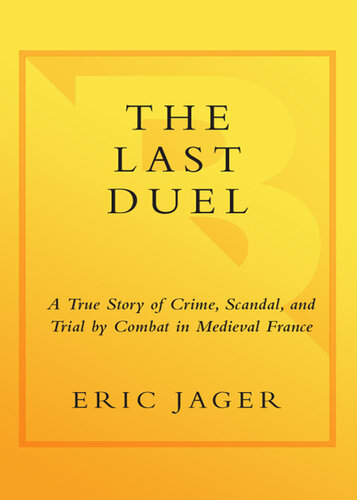
The Last Duel
A True Story of Crime, Scandal, and Trial by Combat in Medieval France
کتاب های مرتبط
- اطلاعات
- نقد و بررسی
- دیدگاه کاربران
نقد و بررسی

July 26, 2004
In 1386, Jean de Carrouges accused his former friend, Jacques LeGris, of raping his wife, and the young king of France allowed their dispute to be resolved in what was to be the last legally ordered judicial combat in Paris. Jager deftly blends this story with the background necessary to understand it: the ideas behind trial by combat, the realities of 14th-century marriage, the complexity of the regional and central powers in France, and the personal rivalries at court. Jager describes a harsh and violent era, when public executions were a form of entertainment and both commoners and elites eagerly anticipated the increasingly rare duel to the death. But it was also a time of lawyers, chroniclers and ceremony. Jager doesn't condescend to the people of medieval France but explains the complicated logic by which they could believe that a duel would prove guilt or innocence, pregnancy could be considered proof that sex had been consensual, and a lady could be convicted and executed as a false accuser if her champion lost. A brief history of the duel demonstrates its origins in age-old military tradition rather than divine providence. Jager acknowledges where the definitive facts of his story are unknown while presenting a riveting account that will satisfy general readers and historians alike. Agent, Glen Hartley for Writers Representatives.

September 15, 2004
Basing his narrative on original chronicles, legal records, and other surviving documents as well as secondary sources, Jager (English, UCLA) presents a vivid re-creation of "the last judicial duel sanctioned by the Parlement of Paris" and a painstakingly documented picture of courtly love, pride, dishonor, and judgment in 14th-century France. Upon his return from a military expedition, Jean de Carrouges was informed by his wife, Marguerite, that she had been raped and was pregnant by Jacques LeGris, a squire at the court of Count Pierre and once a friend of de Carrouges but now a rival. Marguerite brought charges of brutal assault and rape against LeGris; LeGris brought countercharges of unfounded accusations against Marguerite. "Where the sources disagree," Jager warns, noting that people often made contradictory claims in court, "I give the most likely account of events." Jager suggests that the contemporary notoriety of this public trial by combat might have hastened "the demise of an institution...regarded as one of the most barbarous judicial practices of the Middle Ages." Despite this plausible thesis, this is a purchase most suitable for libraries with an interest in the period. Recommended for large public libraries. Robert C. Jones, Warrensburg, MO
Copyright 2004 Library Journal, LLC Used with permission.

Starred review from September 1, 2004
Feudal society in the Middle Ages was founded on a hierarchy of relationships between servants and lords. Improving one's station in life generally meant winning and retaining favor with one's lord. Sometimes this led to competition and jealousy among knights serving the same lord. Such was the case with Jean de Carrouges and Jacques LeGris, two fourteenth-century French nobles (one a knight, the other a squire). A rivalry formed between the once-close friends that started with jealousy, progressed into lawsuits, escalated with the alleged rape of Carrouges' wife by LeGris, and ended with a judicial duel to the death by which (it was believed) the righteous man would be revealed by God himself. Jager provides an excellent depiction of feudal society, placing the reader into the lives of knights and nobles, detailing their relationships with each other and their lords. The ongoing Hundred Years' War and each man's role in it give this personal conflict its historical context. The story of the duel and the rivalry leading up to it make for quick reading as enthralling and engrossing as any about a high-profile celebrity scandal today.(Reprinted with permission of Booklist, copyright 2004, American Library Association.)

























دیدگاه کاربران